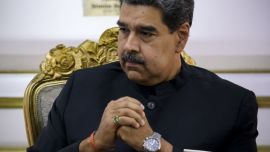My grandfather in India only graduated from high school before beginning his career on a factory floor. My father studied engineering and then launched a small business. I was able to earn a doctorate in chemistry and now live in London working for a multinational.
It’s a story of development and upward social mobility that’s not unusual. Millions of people around the world have experienced a close version of this story and many more have seen their families’ quality of lives improve drastically in the last few decades. Will it be true for the billions yet to be born on a warming planet?
Current trends suggest the answer is likely “no.”
Take the Human Development Index, which measures how long and well people live, whether they have access to education, and what’s their standard of living. Since 1990, HDI had been on an upward trajectory. But not anymore, with successive declines seen in 2020 and 2021.
The Covid-19 pandemic’s health toll and its impacts on the global economy take a lot of the blame, but greenhouse gases are adding up and they’re already starting to slow down progress. Climate change “is genuinely the greatest threat to the future of development,” says Achim Steiner, head of the United Nations Development Programme, in an interview of the Zero podcast. “So a very dark scenario if we don't act.”
It’s an anachronism to think that “development” is defined by a certain level of income per capita, says Steiner. Instead, it is a continuous pursuit of human progress. That means today’s development includes not just access to basic needs like food, shelter and clothing, but also to healthcare, education, and electricity. It also includes ensuring people are protected from communicable diseases, extreme weather disasters, and other global threats.
That means avoiding catastrophic climate change is now at the centre of the development agenda. And it’s what makes climate change “the greatest opportunity,” says Steiner. Acting on climate change means moving from “an extractive, polluting and often depreciating pathway to how we have grown our economies.”
The change can be seen in how the United Nations has been setting development goals. In 2000, the UN set out eight Millennium Development Goals for 2015. The next set includes 17 Sustainable Development Goals to be achieved by 2030. Climate action features strongly in at least six of those goals, and many other goals if achieved will help the world become more resilient in the face of climate impacts.
It is exactly why the UNDP is the organisation within the sprawling network of UN bodies that is responsible for spending the most amount of money on climate-related projects. UNDP’s focus was once to use foreign aid from rich countries to improve lives in poorer ones, but it has been expanding its work in recent years. For example, Argentina is one of the biggest donors to the UNDP. The upper-middle income country relies on UNDP’s support for executing projects tied to environment and welfare.
“Climate change is a consequence of millions of decisions being made” every day, says Steiner. That’s why UNDP is putting climate change at the heart of everything it does, he says.
Thinking about how to act on climate change quickly gets overwhelming. There’s a lot to do and there are lots of barriers. The solutions too can seem abstract, from policies to carbon accounting. But it’s the work that underpins building a world where humans can continue to thrive.
by Akshat Rathi, Bloomberg




















Comments